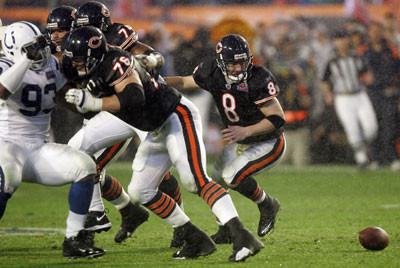Fumbling At the One
 Friday, July 27, 2007 at 01:56AM
Friday, July 27, 2007 at 01:56AM  It’s a heartbreaking scene.
It’s a heartbreaking scene.
The running back, his legs churning, slants across the tackle, dives between a thousand pounds of flesh and stretches out for the goal. Suddenly, somebody takes a swipe at the unprotected football and knocks it loose. A sickening feeling knots up in his stomach as he realizes that his chance for a score, and his team’s chance for a win vanishes—-gone forever. He fumbled at the one-yard line.
Ninety-nine yards of a classic drive go up in smoke when you fumble at the one. Brilliant plays, great coaching and flawless execution all become meaningless statistics when you fumble at the one. The throaty cheers of a home crowd at a thrilling pass or the delirious screams brought on by a breakaway run quickly turn to boos and hisses when you fumble at the one. Once ready to crown you as a hero, the press brands you as a goat when you fumble at the one.
Pardon me for this sports world reference (the Apostle Paul talked of foot racing and boxing), but I see a heavy bit of spiritual principle at work here on several counts.
We are at the one yard line . Bible prophecy lands us squarely in the end of the church age. We should not take it lightly that the technology now exists for the mark of the beast to be applied. Neither should we dismiss the fact that the trend toward a cashless society and the mindset for population control now gathers increasing momentum. Factor in all the other earmarks of the last days and you know that we are at the one-yard line in God’s chronology.
We carry a precious commodity . Only one pigskin football on the field counts. Players may run, dodge and go into motion, but only the man carrying the football has the chance to score. This Apostolic truth still signifies the singular saving message that the church was commissioned to preach. We don’t dare treat it carelessly at the one-yard line.
We’ve got to hang on. A football team consists of eleven men on the field, and many others on the sidelines all of whom anxiously await the successful play of the teammates in the game. In life, how many people look at you for guidance, direction and inspiration? You may not have played a perfect game, but mistakes can be overcome if you just don’t fumble. Tackles for losses, dropped passes, and broken plays can be overcome if you just don’t fumble. Don’t fumble at the one.
We’ve come too far to fumble. A job aborted before completion may as well never been started. The official scorer gives no credit for almost making a touchdown. We run the first yard because we anticipate running the last yard.
Saint of God, you’ve invested too much into your relationship with God to get distracted at this juncture. The present hour demands more intensity than ever. Step up instead of slacking off. Don’t loosen up—-tighten up. Just as the play at the one-yard line gets fiercely competitive, so the days before the rapture will escalate into an all-out spiritual war. But remember, greater is he that is within you than he that is in the world.
All coaches give special advice to their running backs and pass receivers: Take the hand-off or make the catch, hang on tightly, anticipate the hits, and—-above all else—-protect the football. Don’t fly across the goal-line empty-handed. Don’t fumble at the one.








